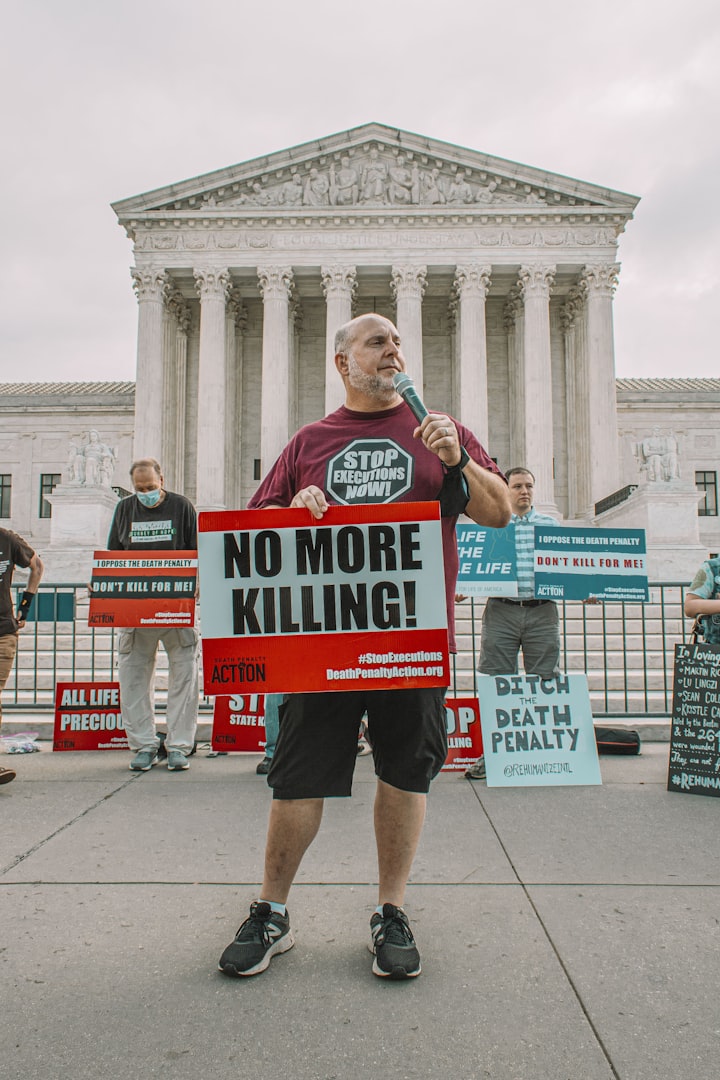Capital Punishment
Why we should get rid of it.

My step-dad Todd and I were having some breakfast together as it was announced that Kyle Rittenhouse was acquitted of all charges in his trial. Todd and I have different opinions and it is rare that we agree on a topic that is politically charged. After it was announced Todd started on a rant about the case and how it shouldn't have been the way it was, and for once Todd and I agreed. He described how he is very hurt over the fact that races were not correctly displayed among the jury. He then proceeded into talking about how he was a police officer for over twenty years and as a man of color he understands both perspectives and that he ended up leaving the force due to too many injustices that he personally saw. It has been made clear that there are still to this day many racial injustices and a lot of them are made within the justice system. An injustice that I researched is capital punishment, I feel like the system is poorly set up and because of that the punishment is unfair.
Black Americans are incarcerated in state prisons at nearly five times the rate of white americans. As of 2014, 42% of those on death row in the United States were black. Since 2002, there have been 12 executions of white defendants where the murder victim was black, however, there have been 178 executed defendants who were black with a white murder victim. 54% of people wrongfully convicted and sentenced to death in the United States are black (Ford, 2014).
Capital punishment obviously has racial injustices in the system, but overall the whole system is flawed. You also see flaws in the rate of innocent people who have been murdered and weren't proven innocent until after their death. Since 1973, at least 186 innocent people's lives have been taken due to death row in the modern system. Research suggests that the actual number of innocent people who have been sentenced to death is far higher and that one in every 25 defendants sentenced to death is likely innocent (Aclu, 2021).
Well, the death penalty is effective in decreasing crime, so we should still keep it to decrease murder, right? Studies show that there is no link between the death penalty and lower crime rates. Death Penalty Information Center did a study on this and found that murder rates in 10 out of 11 countries that have abolished capital punishment experienced a decline in murder rates in the decade following the abolished law. This data is consistent with state-level data in the United States, which has repeatedly shown lower murder rates in states that do not have the death penalty compared to states that do.
The economics support the idea of removing or changing the system of capital punishment as well. Cases without the death penalty cost seventy four hundred thousand while cases with the death penalty are estimated to cost $1.26 million. Maintaining each death row prisoner costs taxpayers ninety thousand more per year than a prisoner in the general population (Bates, 2018). Death row prisoners cost more than prisoners serving life sentences because of the legal consults, judges, and hours of work that go into determining if a prisoner is subject to capital punishment. There is also a money conflict within capital punishment when one is found innocent after trial. When mistakes are made, it is expensive to solve them. A New York teen who was convicted in his parents' murder spent 17 years in prison before being exonerated. Marty Tankleff was a teen when he was falsely convicted of murdering his parents and was not proven innocent until his case was revisited in 2005. Through his exoneration, he won an estimated $3.6 million in his settlement against New York State (Bates, 2018). Although taxpayers did not have to pay any money in the settlement, as it was against the state, taxpayers did pay hundreds of thousands of dollars to keep a man in jail that was innocent, essentially wasting all the money through those seventeen years. No matter what taxpayers will continue to pay into the prison system; because the prison system has been proven to be faulty, tax dollars have been wasted on attorneys, judges, and court time that were not useful in the end as the mistakes made were large and irreversible.
All in all it is made clear through the numbers that death penalty is faulty and should no longer be in place. Hearing from a man of color, who was a police man for over twenty years, talk about his personal experiences with injustices fueled me to research more and I hope learning about these numbers that make it clear that there is still so much injustice will fuel you guys as well.
Bibliography
Bates, Harmoney. “The Economic Values of Capital Punishment.” Criminal, 2018, https://vocal.media/criminal/the-economic-values-of-capital-punishment.
“Capital Punishment.” American Civil Liberties Union, https://www.aclu.org/issues/capital-punishment.
Ford, Matt. “Racism and the Execution Chamber.” The Atlantic, Atlantic Media Company, 24 June 2014, https://www.theatlantic.com/politics/archive/2014/06/race-and-the-death-penalty/373081/
“Study: International Data Shows Declining Murder Rates after Abolition of Death Penalty.” Death Penalty Information Center, https://deathpenaltyinfo.org/news/study-international-data-shows-declining-murder-rates-after-abolition-of-death-penalty.





Comments
There are no comments for this story
Be the first to respond and start the conversation.